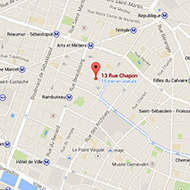On first sight, the drawings of Lenny Rébéré suggest an ambiguous floating landscape that requires us to decipher it, and that demands all of our attention. The image resists, struggling against our will to perceive it in its entirety, to describe it, to understand it. It resists our gaze, experiences it and imposes on it its own movement, its indistinctions and breath. It barely affords it the opportunity to rest on a particular detail, such is it interwoven.
"A series of images rolls across my screen": capture the world by flicking between images without attributing any value to what passes before our eyes. The artist here becomes spectator, a collector perhaps, gathering snippets of lives, events, photographs, commercials in the internet flux... these digital images made public and available to all which no longer allow any alternative than to experience the proximity of anonymous beings, which the artist blends into her own, her story, her images (photos of holidays, friends, places and landscapes visited). Evocative of a chaotic and saturated world where we no longer discern the remarkable because we see too much, where the intimate and the collective are related, Lenny Rébéré's practice commences thus with accumulation.
Then comes the moment of recomposition, when the hand replaces the eye and mobilises the memory. The images are then laid on paper or canvas. The process is long, and the technique precise: by the continuous act of drawing, Lenny Rébéré replaces the action and will at the heart of the creation. These images therefore gradually regain the physicality which their digital nature, far removed from the physico-chemical nature of the initial photographs, has deprived them of. For these orphan images, multiple, and deprived of a body, the time has come for synthesis and reincarnation.
Fragile, vibrant, like transparent layers, they never fully settle, but rather inhabit a singular and disconcerting space in-between where everything seems at once both near and far. The designs merge, the composition almost rejecting any protrusion; in the end there remains only the ghostly image of a receding landscape which indistinct figures or suspended bodies come to inhabit as if locked within an empty frame. Things, places, eras mingle, intertwine, overlap and contaminate each other, composing a third hybrid image, which owes as much to fiction as reality. A synthesis picture which behaves like a dream, by echoing, by fusing, and by successive impressions.
Here reality mingles with possibility and composes a living screen which can our fantasies can enter, whose emergence is all the more striking in that it involves us on both sides of the looking glass. Oscillating between the will to emerge and the temptation to turn in on itself, the image-become-phenomenon therefore reconciles the aesthetic category of the visual (image) and the ontological category of the event (the moment of perception): the action is not only described, but produced by the image, at once the subject and object of our gaze, now able to "make visible the action of organisation in perception".*
Thibault Bissirier, October 2015
* Attributed to Paul Cézanne
Lenny Rébéré was born in 1994, Lyon (France)
He lives and works in Paris


